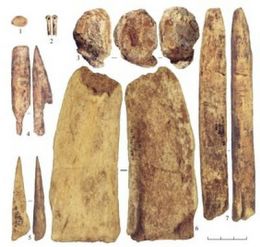
Modern humans who first arose in Africa had moved into Europe as far back as about 45,000 years ago.From the press release:
The evidence consists of stone, bone and ivory tools discovered under a layer of ancient volcanic ash on the Don River in Russia some 250 miles south of Moscow. Thought to contain the earliest evidence of modern humans in Europe, the site also has yielded perforated shell ornaments and a carved
 piece of mammoth ivory that appears to be the head of a small human figurine, which may represent the earliest piece of figurative art in the world, he said.
piece of mammoth ivory that appears to be the head of a small human figurine, which may represent the earliest piece of figurative art in the world, he said."The big surprise here is the very early presence of modern humans in one of the coldest, driest places in Europe," Hoffecker said. "It is one of the last places we would have expected people from Africa to occupy first."
While there is some evidence Neanderthals once occupied the plains of Eastern Europe, they seem to have been scarce or absent there during the last glacial period when modern humans arrived, he said. The lack of competitors like the Neanderthals might have been the chief attraction to the area and the reason why modern humans first entered this part of Europe, Hoffecker said.